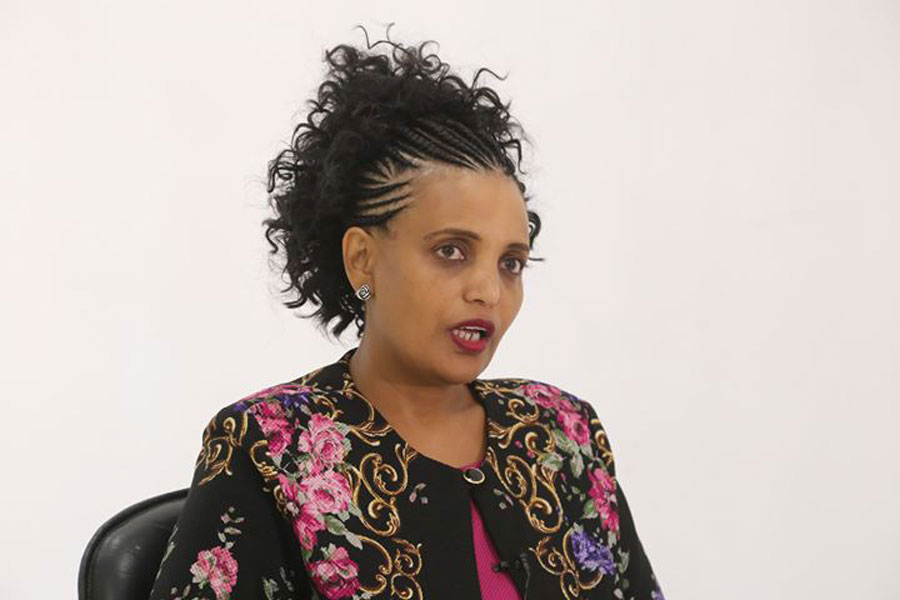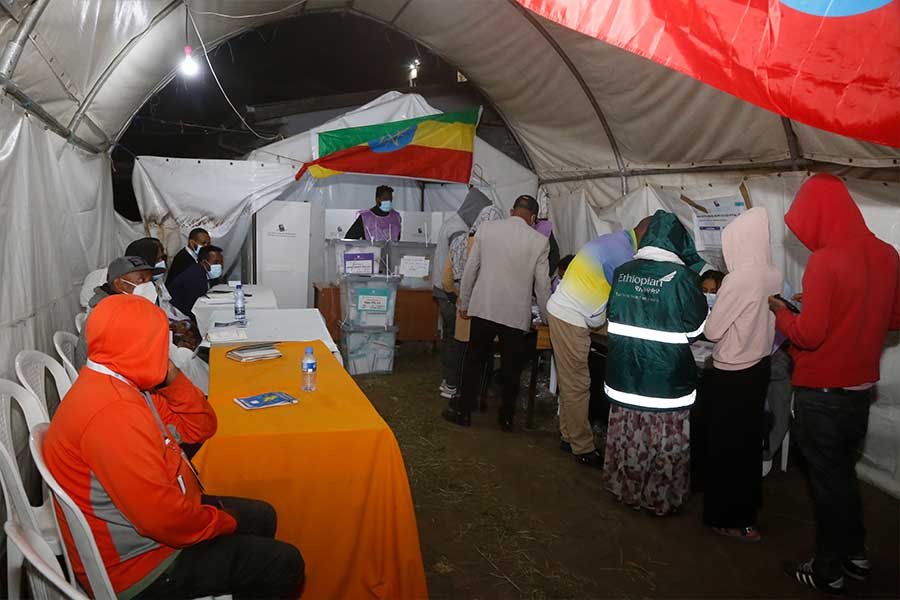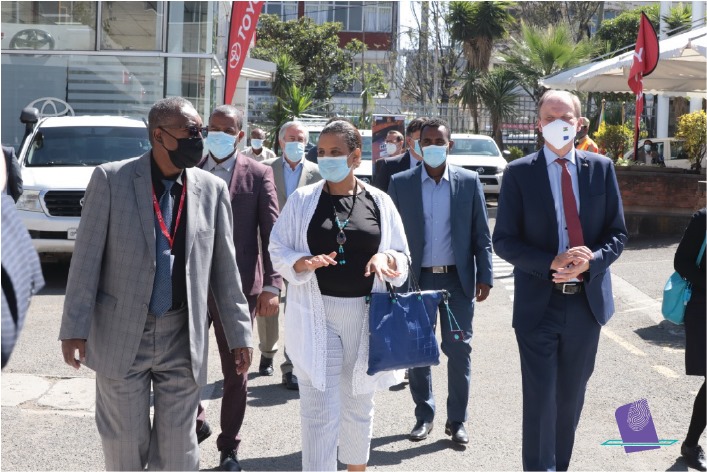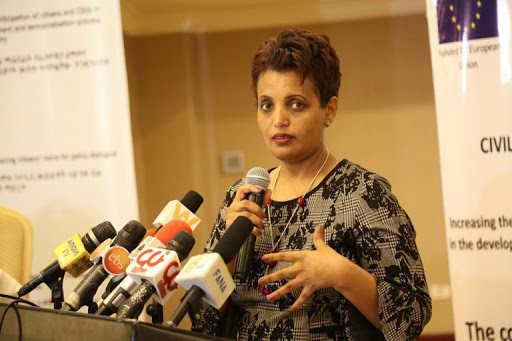
Jun 5 , 2021.
In retrospect, it is nothing less than astounding that the 2015 national elections went pretty much under the radar.
There was not much drama, and it seemed more like one more election the country would go through without much ado. Indeed, the results proved to be a continuation of what was before, with the incumbent, the Ethiopian People’s Revolutionary Democrat Front (EPRDF), and its regional allies taking all of the seats in parliament and the regional states. Only a few months later, the political system would begin unravelling. In four years, the EPRDFites would be dissolved.
Now, another national election will be held in just two weeks – one that has been anticipated for at least three years when Abiy Ahmed (PhD) came to office as the third Prime Minister since the existing constitutional order came into being in the mid-1990s. The final years of Hailemariam Dessalegn’s mandate, taken over by Abiy after the resignation of the first, had felt more like a transition. The priority would be putting in place political and legal reforms that would allow elections to be perceived credible in the eyes of the voting public.
Such elections, credible in the process and outcome, would have paved the way for the formation of a government seen as legitimate, a concept that has remained elusive to all administrations past and present.
Things have not gone as hoped. Due to deep social polarization, political and communal violence created such cleavages that, before long, groups that had given lip service to tolerate opposition branded one another enemies. This was followed by parliament postponing the elections by a year, citing the COVID-19 pandemic, and the Tigray Regional government conducting regional elections deemed illegitimate by the House of Federation. War and conflicts have followed, inaugurating a general feeling of despair across the country - it is a far cry from the premature euphoria for the political optimism the public and the international community felt was at hand in 2018.
The euphoria of political reform was nothing but an outcome of what was insufficiently considered as it was a gullibly understood power struggle within the EPRDFites.
Life goes on, though, as does Birtukan Midksa of the National Election Board of Ethiopia (NEBE), who is drudging on. Even without the explosive political situation that surrounds it, it has been quite a bumpy ride. She has had to drop some 14pc of the constituencies, including 38 in the Tigray Regional State, from the elections due to security issues and disputes. She has seen major opposition parties in the most populous state, the Oromia Region, drop out of the race and has butted heads with regional governments of Harar, Afar and Somalia.
Unsurprisingly, the biggest threat Birtukan faces is the political situation. The long-term implication is that it sheds a long shadow over its legitimacy, as the tit for tat between international observers from the European Union (EU) and the Ethiopian government has demonstrated. It runs the risk of being considered a legitimising exercise by those already in power – unfair and not credible, even if possibly free.
Insecurity is no less a daunting issue, especially in the days and weeks before and after polling day. Even in better times, this has always been a challenge. A study of 50 African elections in the six years before 2017 found that almost all of them saw “cases of electoral violence at some stage of the poll,” according to the Nordic Africa Institute. Polarising discourse mainly perpetuated through social media and sophisticated deep-fakes could unleash the kind of chaos weak central governments are not prepared to handle.
Such issues facing the upcoming general elections could extend beyond the gamut of the responsibilities of an election board.
But there are still issues that need to be cleared out and prepared to hold the elections in a manner that would be considered even remotely successful. And these are actions that observers are already calling out for and should be adhered to by Birtukan and her Board.
She can start by being more transparent about registration numbers and providing access (especially for civil society organisations and political parties) breakdown of data. Registrations started with an alarmingly low rate of voters signing up. Improved campaigning have since brought over 36 million people to register to vote on June 21, a meteoric rise over a few weeks, although much lower than the over 50 million initially projected.
Naturally, this has created suspicions, including from observers. This should be understandable, and the Board should respond by making publicly accessible an audited account of registration numbers segregated into as much detail as possible. It should be data that can be cross-checked - for instance, with census projections - and analysed by contesting parties without revealing any background data of voters. The same should be carried out for outcomes on polling day.
Smoothening and providing better procedures for observers is also necessary. The lack of this is an issue that has been evident with the tit-and-tat with EU observers. Other observers have also noted that the accreditation process by the Electoral Board has ways to go and that they are receiving lacklustre communications and responses from the Board. It recently issued accreditation to a joint mission by the International Republic Institute (IRI) and the National Democratic Institute (NDI) - both American institutions - to observe the upcoming elections, which is commendable. It should build on this by being transparent and responsive to the efforts of these institutions and the 45 domestic observers previously accredited.
Perhaps more critical, nonetheless, is the pandemic, the very reason for the fateful - if not regrettable - postponing of the elections last year. As luck would have it, despite the over 4,000 deaths since recorded, it has not been as devastating. Even the latest wave about two months ago has already been followed by broad pandemic fatigue - parties, concerts and events are back on the calendar.
But it is negligence in times of elections for which India has had to pay the price – paid in thousands of deaths in a single day at the height of the latest wave. It will do well for officials in Ethiopia to remember that between March and May, cases went up 10-fold in India, a surge blamed partly on the election-related campaigning.
With reported case numbers going down over the past few weeks, catastrophe appears to have been avoided, at least for now. On polling day, a maximum of 1,500 people is expected to visit each station in a single day in more than 46,000 electoral stations across the country. These could be explosive as new strains could prove more communicable and fatal than the ones before. In the non-compliance requirements for physical distancing, mask-wearing, and hand hygiene on polling day, the legacy the upcoming elections will leave behind can only be as remorseful as its journey to date.
PUBLISHED ON
Jun 05,2021 [ VOL
22 , NO
1101]

Radar | Dec 25,2023

Election 2021 coverage | Feb 18,2020

Agenda | Jun 26,2021

Sunday with Eden | Nov 09,2024

Election 2021 coverage | Feb 27,2021

Covid-19 | May 31,2020

Life Matters | Mar 21,2020

Commentaries | Jun 01,2019

Covid-19 | Mar 31,2020

Commentaries | Aug 13,2022

My Opinion | 131674 Views | Aug 14,2021

My Opinion | 128040 Views | Aug 21,2021

My Opinion | 126002 Views | Sep 10,2021

My Opinion | 123625 Views | Aug 07,2021

Dec 22 , 2024 . By TIZITA SHEWAFERAW
Charged with transforming colossal state-owned enterprises into modern and competitiv...

Aug 18 , 2024 . By AKSAH ITALO
Although predictable Yonas Zerihun's job in the ride-hailing service is not immune to...

Jul 28 , 2024 . By TIZITA SHEWAFERAW
Unhabitual, perhaps too many, Samuel Gebreyohannes, 38, used to occasionally enjoy a couple of beers at breakfast. However, he recently swit...

Jul 13 , 2024 . By AKSAH ITALO
Investors who rely on tractors, trucks, and field vehicles for commuting, transporting commodities, and f...

Jun 29 , 2025
Addis Abeba's first rains have coincided with a sweeping rise in private school tuition, prompting the city's education...

Jun 29 , 2025 . By BEZAWIT HULUAGER
Central Bank Governor Mamo Mihretu claimed a bold reconfiguration of monetary policy...

Jun 29 , 2025 . By BEZAWIT HULUAGER
The federal government is betting on a sweeping overhaul of the driver licensing regi...

Jun 29 , 2025 . By NAHOM AYELE
Gadaa Bank has listed 1.2 million shares on the Ethiopian Securities Exchange (ESX),...